|
|
|
Sort Order |
|
|
|
Items / Page
|
|
|
|
|
|
|
| Srl | Item |
| 1 |
ID:
065776


|
|
|
| 2 |
ID:
097862
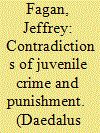

|
|
|
| 3 |
ID:
082795
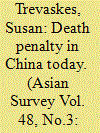

|
|
|
|
|
| Publication |
2008.
|
| Summary/Abstract |
This paper examines a recent debate at the highest level of China's politicolegal leadership on the application of the death penalty. The debate centers around the interpretation of a new criminal justice policy called "balancing leniency and severity" and around limiting the death penalty to all but the most egregious criminals
|
|
|
|
|
|
|
|
|
|
|
|
|
|
|
|
| 4 |
ID:
075007
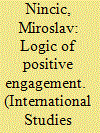

|
|
|
|
|
| Publication |
2006.
|
| Summary/Abstract |
This article is intended to offset, partially at least, the lopsided stress placed by international relations scholarship on punitive pressures, at the expense of positive inducements, as tools for bringing renegade regimes into compliance with internationally accepted norms of behavior. I discuss the focus on punishment as a tool of foreign policy and the reasons why this bias has provided disappointing results. Using a parallel theoretical framework, I then discuss the forms that inducements can assume and the circumstances encouraging their success. The hypotheses thus derived are applied to a number of specific policy challenges. The bottom line is that inducements can, at times, produce a direct quid pro quo from the target regime and, occasionally, can modify that regime's basic motivations, so that both punishments and rewards become less necessary. In any case, positive engagement is most effective when regime's position is being challenged from within.
|
|
|
|
|
|
|
|
|
|
|
|
|
|
|
|
| 5 |
ID:
138916
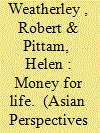

|
|
|
|
|
| Summary/Abstract |
In this article we examine the debate among legal experts in China over the recent practice of death penalty criminal reconciliation (DPCR), which is a program that seeks to reconcile an offender convicted of a capital offense with the victim by requiring the offender to meet with, apologize, and pay economic compensation to the victim in exchange for a death sentence commuted to life in prison. Proponents of DPCR believe it provides important financial and emotional benefits to victims, helps rehabilitate offenders, and alleviates the wider social tensions generated by the offense committed. Opponents argue that DPCR violates the basic principle of equality before the law because the decisions reached using this process are sometimes influenced by public opinion and often biased toward those who can afford to pay compensation. These critics suggest that DPCR should be replaced with a comprehensive system of state compensation for victims of capital offenses.
|
|
|
|
|
|
|
|
|
|
|
|
|
|
|
|
| 6 |
ID:
161565
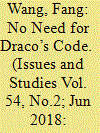

|
|
|
|
|
| Summary/Abstract |
The occasional “strike hard” campaigns against crime launched by the Chinese government provide an opportunity to isolate the separate effects of severity and certainty of punishment on the crime rate. The “strike hard” campaigns increase the severity of the punishment but keep the certainty of the punishment unchanged. We use provincial panel data from 1988 to 2015 to examine the impacts of the two strategies on the crime rate with pooled mean group models. The empirical results show that a significant decrease in crime rates is associated with greater certainty of detection, but greater severity has no significant effect. A 1% increase in the detection rate (a measurement of certainty) predicts about 2.7% lower crime rate. The results are robust even after considering the endogenous nature of punishment policies and controlling for the measurement error in the officially reported data.
|
|
|
|
|
|
|
|
|
|
|
|
|
|
|
|
| 7 |
ID:
064846


|
|
|
| 8 |
ID:
187742


|
|
|
|
|
| Summary/Abstract |
Survey data on Indian labour points to a rapid expansion of the care-domestic economy, currently the main employment avenue for urban women. Hitherto, studies on domestic service portray the unequal class structures of master–servant relationships and the escalating phenomenon of live-out and part-time hired help. This article shifts the focus to under-researched, yet increasingly visible, placement agencies, which regulate care-domestic markets and provide diverse services, from specialized ‘patient care’ to the training of subaltern communities. The article discusses how these service providers denote prominent shifts in skill sets, intra-household care arrangements, forms of medical assistance, and new (and old) mechanisms of authority. The ethnography expands our knowledge of everyday mediations around hiring and training between agencies, employers, and care-domestic workers in New Delhi. The article puts forward innovative conceptualizations of service provider approaches through juxtaposing the informal practices of local (or Indian) agencies with formalized and ‘civilizing’ agendas developed by Euro-American intermediaries. The formal–informal dichotomized framework of service provider relationships adds to critical scholarship that contrived dualisms which need historical scaffolding and nuanced engagement. I argue that, while informal and formal approaches appear markedly different for the care-domestic economy, they also overlap. Significantly, both approaches are unjustly weighted against the workers who lack the potential to democratize labour relations. Local agencies reinforce exploitative care-domestic relationships, while Euro-American intermediaries, who espouse modern values, formalization, and civilizing experiments, promulgate punitive regimes and stigmatized futures for their Indian subjects.
|
|
|
|
|
|
|
|
|
|
|
|
|
|
|
|
| 9 |
ID:
069791


|
|
|
| 10 |
ID:
086003
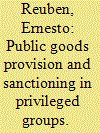

|
|
|
|
|
| Publication |
2009.
|
| Summary/Abstract |
In public-good provision, privileged groups enjoy the advantage that some of their members find it optimal to supply a positive amount of the public good. However, the inherent asymmetric nature of these groups may make the enforcement of cooperative behavior through informal sanctioning harder to accomplish. In this article, the authors experimentally investigate public-good provision in normal and privileged groups with and without decentralized punishment. The authors find that compared to normal groups, privileged groups are relatively ineffective in using costly sanctions to increase everyone's contributions. Punishment is less targeted toward strong free riders, and they exhibit a weaker increase in contributions after being punished. Thus, the authors show that privileged groups are not as privileged as they initially seem.
|
|
|
|
|
|
|
|
|
|
|
|
|
|
|
|
| 11 |
ID:
142566
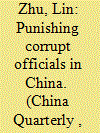

|
|
|
|
|
| Summary/Abstract |
China presents a mixed picture in terms of its anti-corruption efforts. On the one hand, rampant corruption remains a huge challenge for the party-state because it not only results in the loss of state assets but also damages the legitimacy of the regime. On the other hand, China's record of curbing corruption is not particularly worse than other comparable countries. This paper explains the reasons behind this mixed picture by focusing on the anti-corruption strategy employed by the central Party authorities. Effective anti-corruption measures are determined by the high probability of detecting corrupt agents and the meting out of effective and warranted punishment. In China, the central government is unable or unwilling to investigate a large number of officials, especially high-ranking officials. However, at the same time, it must impose severe punishment on convicted high-ranking officials. Although this mode of selective discipline compromises the credibility of the state in terms of anti-corruption efficacy, it also creates uncertainty for corrupt agents because corrupt officials are not guaranteed exemption.
|
|
|
|
|
|
|
|
|
|
|
|
|
|
|
|
| 12 |
ID:
145989
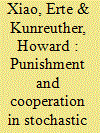

|
|
|
|
|
| Summary/Abstract |
Previous findings on punishment have focused on deterministic environments in which the outcomes are known with certainty. In this article, we conduct experiments to investigate how punishment affects cooperation in stochastic social dilemmas where each person can decide whether to cooperate, when the outcomes of alternative strategies are specified probabilistically. Two types of punishment mechanisms are studied: (1) an unrestricted punishment mechanism—both persons can punish—and (2) a restricted punishment mechanism—only cooperators can punish noncooperators. We compare behavior in a two-person deterministic prisoner’s dilemma game (DPD) with a two-person stochastic prisoner’s dilemma (SPD). In all treatments, participants are given information on the other person’s actions. We find that in both games, the restricted punishment mechanism promotes more cooperative behavior than unrestricted punishment. However, the difference in the degree of effectiveness between the two mechanisms is smaller in the SPD game than in the DPD game because noncooperative behavior is less likely to be punished when there is outcome uncertainty. Our findings provide useful information for designing efficient incentive mechanisms to induce cooperation in a stochastic social dilemma environment.
|
|
|
|
|
|
|
|
|
|
|
|
|
|
|
|
| 13 |
ID:
095634
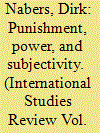

|
|
|
| 14 |
ID:
085453
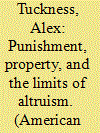

|
|
|
|
|
| Publication |
2008.
|
| Summary/Abstract |
The standard interpretation of Locke assumes symmetry between punishment by individuals in the state of nature and punishment by states in the state of nature. The standard interpretation is incorrect because in cases where the punishment is altruistic, the state is not the functional equivalent of a person, having a more restricted power to punish. The asymmetry arises from Locke's contractualism because individuals in the state of nature might reasonably refuse to give governments the power to punish altruistically. This interpretation clarifies some ongoing puzzles about Locke's theory of property where questions about coerced sacrifices to benefit others also arise. Locke's argument is vulnerable to important objections, specifically that he equivocates on the meaning of the word "body," that he places too much emphasis on the right of self-preservation, and that he legitimates nearly unlimited appropriation by states.
|
|
|
|
|
|
|
|
|
|
|
|
|
|
|
|
| 15 |
ID:
097860
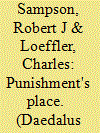

|
|
|
| 16 |
ID:
074076
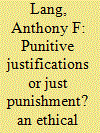

|
|
|
|
|
| Publication |
2006.
|
| Summary/Abstract |
Can the use of military force in response to violations of human rights norms be meaningfully described as 'punishment'? If so, does this form of punishment help to constitute a just and peaceful international order? This paper investigates these two questions by examining the use of strategic bombing in campaigns of coercive diplomacy as a means to punish states. The paper explores the concept of punishment and its relevance for international affairs as a theoretical basis. It then turns to two cases of punitive uses of force-US and UK strikes against Iraq in 1998 and NATO strikes against Serbia in 1999. These two military campaigns are assessed as punitive but not necessarily just in that they fail to fit within a clear, legal institutional order and confuse the agent that deserves punishment. The paper concludes by suggesting that while punishment may be necessary for a legitimate international order, current punitive actions do not support such an order.
|
|
|
|
|
|
|
|
|
|
|
|
|
|
|
|
| 17 |
ID:
121847
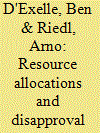

|
|
|
|
|
| Publication |
2013.
|
| Summary/Abstract |
Resources are often allocated in groups through decentralized nonmarket mechanisms. We experimentally investigate groups where a rich representative allocates resources among poorer members, who can announce disapproval by voting for a measure hurting the representative. We examine the effect of inequality aversion by keeping information on the allocation private in one and commonly known in another condition. Further, we investigate whether casting votes publicly or secretly influences allocation and voting behavior. We find that disapproval rates are highest with secret voting or a commonly known resource allocation. Disapproval voting fails to stimulate representatives to appear more prosocial, but rather induces them to keep everything. Private information on the allocation and public voting leads to least disapproval and exclusion of the poorest group members from the resources. The analysis shows that inequality aversion of poorer group members crucially interacts with the investigated institutional and informational details of the resource allocation situation.
|
|
|
|
|
|
|
|
|
|
|
|
|
|
|
|
| 18 |
ID:
053913
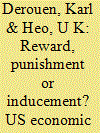

|
|
|
| 19 |
ID:
077229
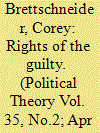

|
|
|
|
|
| Publication |
2007.
|
| Summary/Abstract |
In this essay I develop and defend a theory of state punishment within a wider conception of political legitimacy. While many moral theories of punishment focus on what is deserved by criminals, I theorize punishment within the specific context of the state's relationship to its citizens. Central to my account is Rawls's "liberal principle of legitimacy," which requires that all state coercion be justifiable to all citizens. I extend this idea to the justification of political coercion to criminals qua citizens. I argue that the liberal principle of legitimacy implicitly requires states to respect the basic political rights of those who are guilty of committing crimes, thus prohibiting capital punishment.
|
|
|
|
|
|
|
|
|
|
|
|
|
|
|
|
| 20 |
ID:
145460
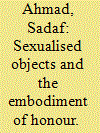

|
|
|
|
|
| Summary/Abstract |
A number of popular Pakistani films feature rapes and attempted rapes, supporting a rape culture that needs to be problematised. I analyse these films and demonstrate that this gendered form of violence serves multiple functions, providing the audience with gratuitous entertainment, developing the narrative and/or punishing women. These functions, which are by no means unique to Pakistani film, incite, excuse and normalise sexual aggression, so supporting a strong rape culture. I also draw attention to more culturally specific honour-based ideologies in these films and demonstrate how these can also encourage and legitimise rape. This leads to a more holistic understanding of what this local rape culture entails. I show that the mainstream film industry has consistently portrayed this culture and suggest that filmmakers’ allegiance to such narratives has therefore amplified the promotion and reproduction of a rape culture in Pakistani society.
|
|
|
|
|
|
|
|
|
|
|
|
|
|
|
|
|
|
|
|
|